The NFL comes to Dublin: How it became the richest sports league in the world
Listen | 26:19
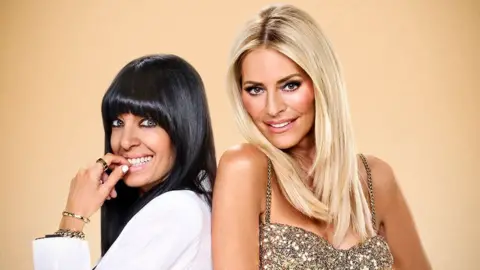
Read full article on post.
Noor NanjiCulture reporter
It’s that time of year again.
A few weeks ago it was picnics and hanging the washing outside. Now kids are back at school, the nights are drawing in – and Strictly Come Dancing is back.
There are 15 couples hoping to waltz their way to the glitterball trophy, with the first live show taking place on Saturday night.
A former Love Islander, a cabaret singer and a YouTube star – this year’s Strictly has a packed line-up of celebs.
I’ve been backstage to meet some of them, to hear just how gruelling the training has been, what they’re most looking forward to – and what they’re most terrified about.
Before that, though, here’s a reminder of who’s on this year’s show.
On last week’s launch show, we found out which celebrities were paired with which professional dancers. Here’s the list in full:
*announced later
Former Love Islander Dani Dyer had also been due to take part. But she pulled out this week after breaking her ankle. Actress and West End star Amber Davies, who is also an ex-islander, has been drafted in as her replacement.
Game of Thrones actor Kristian Nairn also withdrew from the line-up earlier, on medical grounds.
Two pro dancers – Warr and Caillon – are new for this year.
But not everything has changed.
This year’s hosts are the same – Tess Daly and Claudia Winkleman.
There’s no change to the judges’ panel either. Craig Revel Horwood, Motsi Mabuse, Anton Du Beke and head judge Shirley Ballas will be watching every step taken by the dancers.
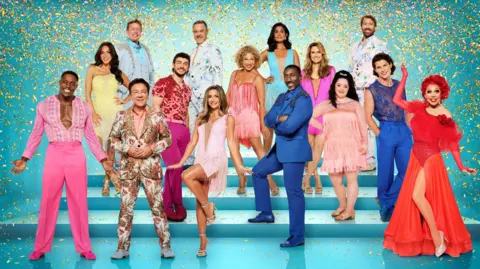
Weeks of intense training lie ahead. So why would anyone go on the show?
Alex Kingston, a star of stage and screen for more than 40 years, including in Doctor Who and ER, said she’s taking part to show others “anything is possible”.
“To be perfectly honest, I don’t feel necessarily any different than I did 20 years ago,” the 62-year-old said.
“And so I just think, if it’s something that you want to do, go for it. And also it’s important to stay healthy and to learn things.”
Meanwhile Neighbours star Stefan Dennis has a very personal reason for wanting to appear on Strictly.
“I actually am doing this for my wife, so I can dance with her,” the 66-year-old told me.
“My wife was a professional dancer, she is still is a dancer, and she’s married to a bloke who can’t dance to save his life. And it would just be really nice to take her out dancing.”
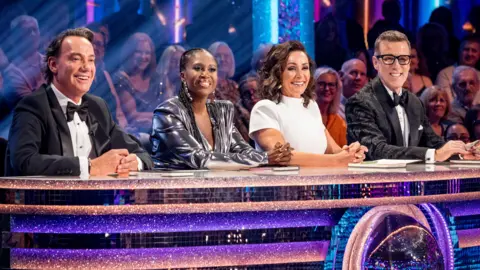
When I meet the couples at Elstree studios in Hertfordshire, they’ve been busy practising for the group routine.
Not everyone showed up for the interviews. Former Apprentice star Thomas Skinner dropped out of his slot the night before.
Skinner also walked out of a press event early, after seeing a message on a reporter’s phone which – he later said – “caught [him] off guard”.
I asked the celebrities who did turn up, how the training was going.
“It’s hard for me to let go of the whole, ‘I don’t dance’ thing, and just fully get into it, but that’s what I want to do. And I feel like I’ve started a bit… maybe,” said YouTuber and podcaster George Clarke, 25.
Clarke also told me he was ready for some hard home truths about his moves.
“I think it would be silly for me to turn up and think, week one, well, I’m going to go out there and the judge is going to say, ‘I’ve never seen anything like this’,” he said.
“I’m inviting it, because I think I’ll most likely be like, that’s fair enough.”
Former Team GB sprinter Harry Aikines-Aryeetey – also known as Nitro in Gladiators – is no stranger to performing in front of audiences.
But the 37-year-old said Strictly is “totally different” to anything he’s used to.
“I’m learning more about myself through the process,” he said.
“Obviously, I’m not trained in any capacity in this way of life,” he added. “So I’m quite excited to see how I deal with that.”
That’s not to say there aren’t nerves though.
EastEnders star Balvinder Sopal, 46, said being on Strictly was a “dream”, who fell in love with the first series and has been hooked ever since.
“And now that I’m here, I’m absolutely petrified,” she laughed. “I don’t really know what to expect. I just keep thinking, have I made the wrong decision? I haven’t, but yes, it’s quite terrifying being on the actual other side of it.”
Model and actress Ellie Goldstein, 23, also admitted to feeling nervous.
She said she was particularly worried about learning the Charleston and the tango.
But Goldstein – who is the first star with Down’s syndrome to take part in a regular series of the dance show – also gave an insight into what she is most looking forward to.
“The spray tans, the hair and make-up, and the sparkles, the costumes… and the glamour,” she said.
Strictly, which has been airing since 2004, has faced multiple controversies in recent years relating to the behaviour of some of its professionals and celebrity guests.
This summer, the Metropolitan Police said it was investigating allegations of drug use on the show.
Separately, an unnamed star from the show was arrested on suspicion of rape. It is understood the man is not related to the new series of Strictly.
When asked whether the various controversies had put her off taking part in the show, Kingston said they hadn’t.
“I don’t really follow anything that’s outside of the actual show or the programme itself. So no, that didn’t bother me at all actually. I just wanted to get on with learning how to dance.”
“I don’t know what you’re talking about,” added Australian actor Dennis. “Remember I come from the other side of the world.”
The Strictly live shows will run from Saturday right the way up to December.
This year’s series will also include all the usual theme weeks, including the Blackpool week.
Earlier this month, Strictly proved it remains a hit with viewers, who voted it best talent show at the National Television Awards.
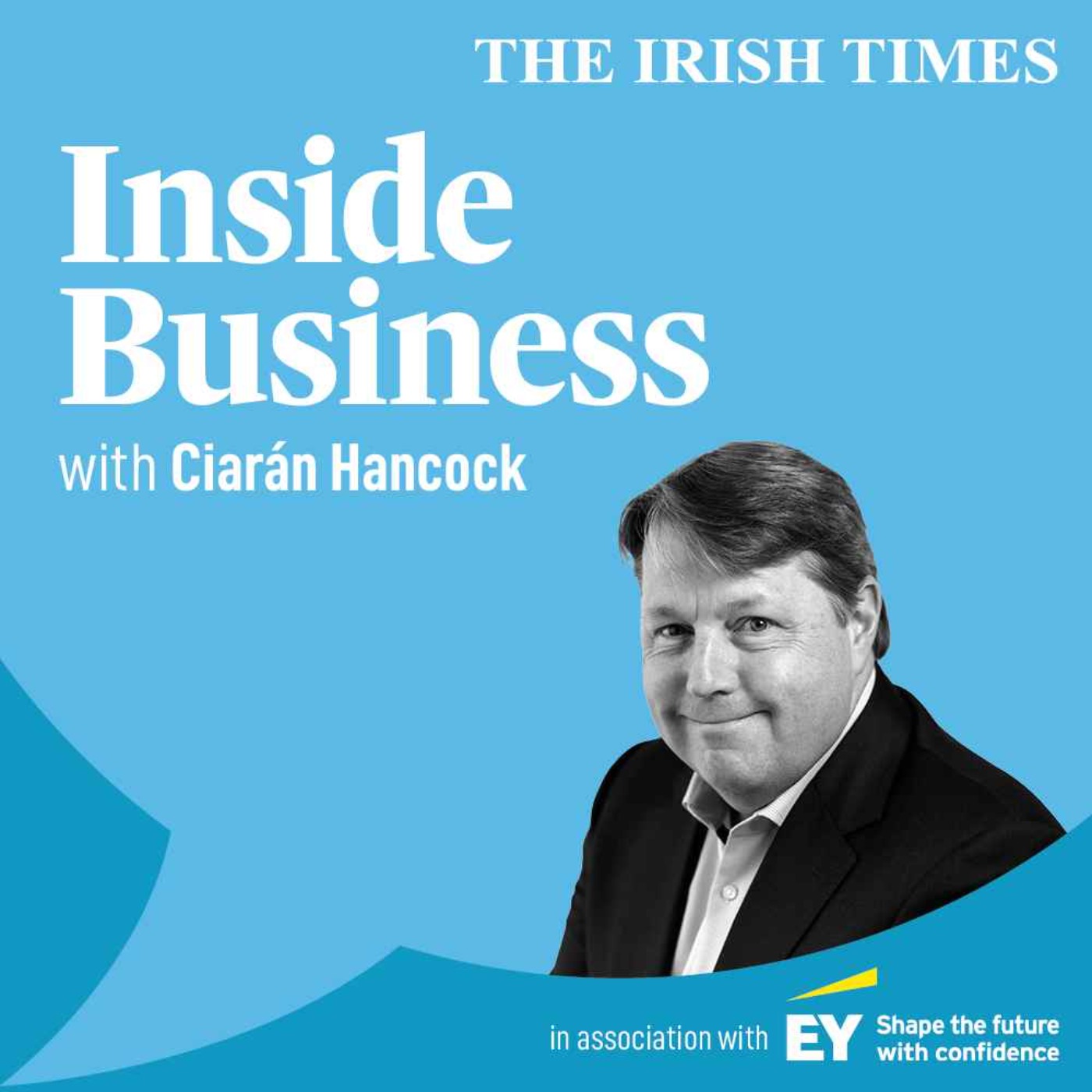
Read more on post.
Fed up with Kingspan shares drifting behind peers and the wider market, Gene Murtagh is seeking to tap into some of the energy of the Magnificent Seven (Mag-7), the US tech stocks that have driven a three-year bull run across global equity markets.
The Kingspan chief executive revealed on Tuesday that the insulation giant founded 60 years ago by his father, Eugene, plans to float 25 per cent of its advanced building systems unit Advnsys, which is focused on supplying the global data centres boom, in Amsterdam.
The mushrooming of data centres has been turbocharged by the artificial intelligence (AI) revolution that has driven the share prices in recent times of Mag-7 stalwarts such as chipmaker Nvidia, Microsoft, Google-parent Alphabet and Meta, owner of Facebook and Instagram.
Close to $7 trillion (€6 trillion) will need to be spent on data centres globally by 2030, driven by demand for hubs equipped to handle AI processing loads, McKinsey, the management consultancy firm, estimated in a recent report.
“We’re acutely cognisant of the fact that relevant sector peers – and these are not building sector peers, they’re tech-end peers that are supplying the data centre market – are trading at and above 20 times Ebitda,” Murtagh said on a call with analysts, referring to how others in the data centre space are being valued by the stock market at more than 20 times earnings before interest, tax, depreciation and amortisation. Valuing Advnsys along these lines would give it an initial market capitalisation of at least €6 billion.
[ Kingspan shares soar on potential €6bn flotation of unit riding data centres boomOpens in new window ]
Kingspan had lost more than a third of its market value in the four years before the move was announced – and was down 21 per cent on the year as it grappled with what Murtagh recently described as an ongoing “pretty unforgiving environment” for construction suppliers globally as households and businesses fret about a potential recession. The group is trading at about 10 times Ebitda – compared with its 10-year average of 13.5.
Compare that with Vertiv, an Ohio-based provider of critical infrastructure and services for data centres, whose stock has soared more than 400 per cent over the past four years.
Or with Trane Technologies, the Swords-headquartered but New York-listed maker of heating and cooling systems for commercial buildings, whose market value has more than doubled in the same period, to $90 billion, amid a surge in demand for its data centre air-cooling systems.
Listen | 26:19
The AI boom – like red-hot stock market trends before it – has attracted blatantly cynical pivots and rebrands from companies trying to jump on the bandwagon.
But Kingspan has been a supplier to the data centres market since before Murtagh became CEO 20 years ago. The new Advnsys unit being lined up for an initial public offering (IPO) – which combines its data centre solutions and light, air and water businesses into one – is a world leader in bespoke critical infrastructure primarily focused on data centres, ventilation and daylighting.
[ Kingspan trades profit for position in US roofing raceOpens in new window ]
While about 40 per cent of Advnsys’s earnings currently come from providing infrastructure to the tech sector, particularly to data centres, this is expected to grow to about 75 per cent of an even bigger business in the next three to five years, according to the group.
Citigroup analysts reckon the subsidiary could more than double its revenue and Ebitda between 2024 and 2030, to €3.2 billion and €525 million, respectively.
Shares in Kingspan jumped as much as 13.5 per cent to €74.85 on Tuesday morning, but have since handed back almost half their gains as some analysts urged caution.
“While we understand the [market] reaction, particularly in light of the stock’s weaker performance year-to-date, we do not yet understand how a partial IPO creates additional value, nor how the market will arbitrage valuation between the two businesses,” said JP Morgan analysts led by Elodie Rall in a note to clients.
Advnsys may attract a higher valuation multiple, but this is likely to be offset by the market giving the rest of the business – comprising insulated panels, other insulation solutions and its roofing and waterproofing unit – a lower one, she said.
Bernstein’s Pujarini Ghosh said the market excitement earlier in the week had been “overdone” and her €70 price target on the group points to almost 3 per cent downside from here. A listing of Advnsys in New York “could potentially have helped unlock greater value given the business mix will be more heavily skewed to the US”, she said.
About 45 per cent of the unit’s business is exposed to the US, but this is expected to rise well above 50 per cent in the coming years.
Murtagh said the decision to float on Euronext Amsterdam is down to the high level of trading in stocks in that market, a lack of stamp duty there, too, and how the same accounting standard (IFRS) applies to companies in the Netherlands and Ireland.
For sure, the level of trading in Euronext Dublin has slumped over the past five years amid a number of company exits and a dearth of fresh IPOs.
[ How Kingspan stands to benefit from AI boomOpens in new window ]
But to avoid the 1 per cent stamp duty applied to share trading in Irish companies, Kingspan will need to incorporate Advnsys as a public limited company – or naamloze vennootschap (NV) – in the Netherlands.
A nice bonus from the planned IPO is that it would, according to Murtagh. leave both Kingspan and Advnsys “essentially with zero debt” – giving them plenty of scope to invest and grow by acquisition.
Whereas Kingspan’s share price tends to move with the broader construction industry cycle, Advnsys’s stock will be far more sensitive to developments in AI, making it potentially much more volatile.
Chinese tech group DeepSeek, for example, showed the world earlier this year that its approach to generative AI needs just a fraction of the computing power of more prominent US tools, such as ChatGPT. Could demand for data centres decline as AI systems become more efficient?
One thing’s for sure: savvy investors in Advnsys in Amsterdam will have alerts set for anything coming from another company 9,000km away. For now, Nvidia in Santa Clara, California, remains the bellwether for all things AI.
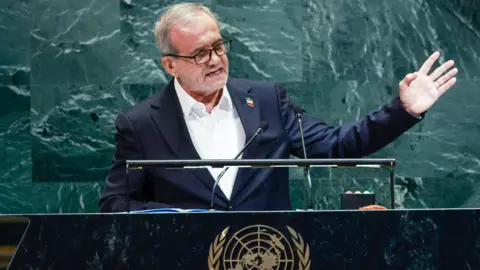
Read full article on post.
Lyse DoucetChief international correspondent, New York and
Raffi Berg
The United Nations’ sweeping economic and military sanctions look set to be reimposed on Iran a decade after they were lifted in a landmark international deal over its nuclear programme.
It comes after the UK, France and Germany wrote to the UN Security Council last month, accusing Iran of failing to fulfil its commitments. That triggered a mechanism giving Iran 30 days to find a diplomatic solution to avert renewed sanctions.
Iran’s President Masoud Pezeshkian condemned the re-imposition of international sanctions as “unfair, unjust, and illegal”.
A last-minute resolution, led by China and Russia, to delay the move by six months only received four votes in the 15-member council.
The sanctions are set to come into force at 00:00 GMT on Sunday.
Iran stepped up banned nuclear activity after the US quit the deal in 2016. Donald Trump pulled the US out in his first term as US president, criticising the deal – the Joint Comprehensive Plan of Action (JCPOA) – negotiated under his predecessor Barack Obama as flawed.
Iran barred IAEA inspectors from accessing its nuclear facilities after Israel and the US bombed several of its nuclear sites, as well as military bases, in June after negotiations held indirectly between the US and Iran to try to reach a new nuclear deal became deadlocked.
President Pezeshkian told the UN this week that his country would never seek to build a nuclear bomb.
Speaking to a group of journalists, Pezeshkian accused foreign powers of seeking a superficial pretext to set the region ablaze, insisting that, despite previous threats, Iran would not quit the Non-Proliferation Treaty.
But he added that Tehran would need reassurances that its nuclear facilities would not be attacked by Israel in order to normalise its nuclear enrichment programme.
Pezeshkian kept pointing to the negotiations which had taken place before Israel and the US bombed Iran’s nuclear sites in June and accused the Americans of not taking the talks seriously. The sanctions add yet more strain to an already fraught situation.
The sanctions would include:
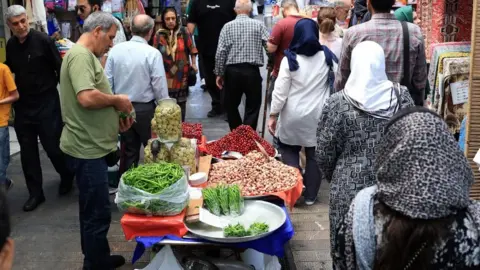 Reuters
ReutersUnless a solution is found, UN sanctions would come into force first, followed by EU sanctions next week.
European foreign ministers had tried to avert the council’s step by urging Iran to resume negotiations with the US; to cooperate with the UN’s nuclear watchdog the IAEA, and to account for its highly enriched uranium stockpile.
Speaking at the UN on Friday, Iranian Foreign Minister Abbas Aragchi said: “The United States has betrayed diplomacy, but it is the E3 (Britain, Germany and France) which have buried it.”
“The negotiation with the United States is in fact a pure dead end,” Aragchi added.
Iran is legally obliged under the nuclear treaty to allow inspections.
It has been in talks this week with the IAEA to find a way forward, but has warned that a return of sanctions will put that in jeopardy.
On Friday, the IAEA confirmed that inspections of Iranian nuclear sites had resumed this week after a hiatius following Washington and Israel’s strikes.
Western powers and the IAEA say they are not convinced that Iran’s nuclear programme has purely peaceful purposes.
Iran strongly insists it is not seeking nuclear weapons, and that its programme is solely a civilian one.
Russia on Friday signed a $25bn deal with Iran to build four nuclear power reactors in southern Iran, Iranian state-run IRNA news agency reported.
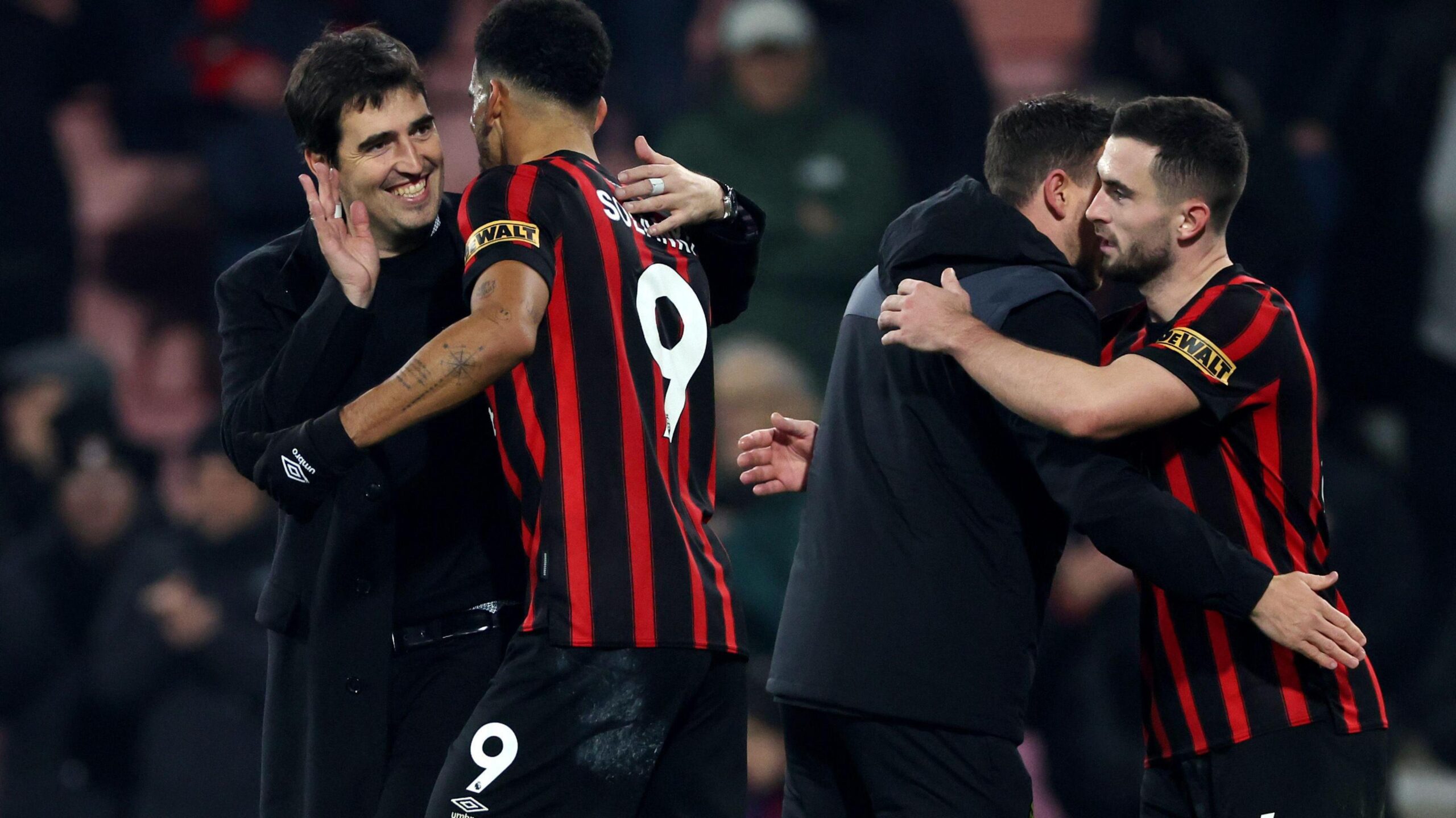
Read full article on post.

The Football Interview is a new series in which the biggest names in sport and entertainment join host Kelly Somers for bold and in-depth conversations about the nation’s favourite sport.
We’ll explore mindset and motivation, and talk about defining moments, career highs and personal reflections. The Football Interview brings you the person behind the player.
Interviews will drop on Saturdays across BBC iPlayer, BBC Sounds and the BBC Sport website. This week’s interview will be broadcast on BBC One from 23:55 BST on Saturday, 27 September (and after Sportscene in Scotland).
———————————————————
Andoni Iraola did not have the highest profile when he became Bournemouth manager in June 2023, but two years on he is one of the hottest properties in world football.
Iraola started his football education at renowned Basque club Antiguoko alongside Xabi Alonso and Mikel Arteta – now managers of Real Madrid and Arsenal respectively.
In his four seasons as captain of Athletic Club, he reached two Copa del Rey finals, a Europa League final and qualified for the Champions League.
After moving into management, he worked at AEK Larnaca, Mirandes and Rayo Vallecano before moving to England and guiding Bournemouth to their highest Premier League points tally in a season.
The 43-year-old has been linked with Real Madrid, Tottenham and Manchester United in recent months – highlighting how high his stock has risen.
Iraola sat down with Kelly Somers to talk about his childhood, the main influences on his managerial career, and his love of reading.
Kelly Somers: What does football mean to you?
Andoni Iraola: Football was my hobby and it has become now a professional thing. I still love the game, but once you become professional it’s not just pure passion, I think it changes a little bit. You see football like an ideal world when you are out of the game and you would love to work there, and when it becomes your everyday work, it’s just a workhorse.
Kelly: But you still love it?
Andoni: Yes.
Kelly: What’s your earliest memory of playing football?
Andoni: I think probably my best memories are on the beach in San Sebastian. We used to play there with the school team. I don’t know if we started five, six or seven years old, and you can play every two weeks [because of the tide]. One weekend you cannot play because there is no beach. And the next one there is the beach, and you can. Every time we would play there. It’s lovely memories.
Kelly: Can you remember the first team that you played for?
Andoni: I started with the school team and then the first proper team was a neighbourhood team. Then I moved to Athletic Club when I was 16, so I didn’t grow up thinking I was going to become a football player. It came quite late. I was decent, obviously. I was good, but until I was 16, I didn’t really realise that this can be a little bit more than just your hobby and maybe I have a chance.
Kelly: Can you remember that moment where you thought, ‘yes, I can have a chance’?
Andoni: Yes, I was worried when I had this opportunity… I lived more or less one hour from Bilbao. I had to move and I had to change schools and live alone in the academy. And I was a little worried, thinking maybe I don’t have the level to play with these guys. When I arrived there, I could see I could survive… maybe I have a chance. But I think it was quite late, yes.
This video can not be played
Kelly: Early on in your career, you crossed paths and played with some pretty famous other managers. Can you tell us about that?
Andoni: Yes. It’s incredible because when we were seven, eight, nine, I played with Mikel Arteta, I played with Xabi Alonso. We are more or less the same age, playing sometimes against each other because I was in a school and they were in other schools when we were playing on the beach. Then after we played together in a small club, also in Antiguoko, and now it’s amazing that we see each other on the football pitches almost 40 years later.
Kelly: Are there any managers in particular that have had a big impact on your career?
Andoni: Yes, in my case there is especially Ernesto Valverde – a very clear one because he was the one when I moved to Athletic Club at 16. In the under-18s he was the manager, and he was also my manager when I was in the second team at Athletic Club. He was the first one who gave me the chance to have my debut. Even after that, he was my manager when I left the club around 13 years later – he came back after managing other clubs and has been really influential in my career and today still is our manager. Athletic Club is my team and for me he has been probably the key figure if we talk about a manager who has influenced your career.
Kelly: You’ve mentioned Valverde. If I could push you for three, who else?
Andoni: I’ve had very good managers. Now a lot of people ask me about Marcelo Bielsa and I feel very lucky to have had him for two seasons. He is someone that watches the game in a different way, and I think it’s very useful when you are going to transition to the managerial career. I’ve never him had as a manager, but I’ve always liked when we faced Carlo Ancelotti. For someone who has been so brilliant, has won so many things in big clubs, he is very normal when you speak with him, when you face him. It’s someone that I always had a good feeling with.
Kelly: You’ve managed and played in a number of different countries, but which one would you say had the biggest impact on you as a manager?
Andoni: I would say probably the year and a half I spent in America. It is probably not the biggest league – not the best moments of my career because I was probably already on my decline as a player, but it was the moment where I realised I was going to retire and I started thinking about the game in a different way. I also had Patrick Vieira as a coach. He showed me a different style of play because he was coming from the Manchester City academy, where there was more positional play and I was used to a different style of play. It was an experience that has helped me a lot in management. I was lucky to have had that at the end of my playing career.
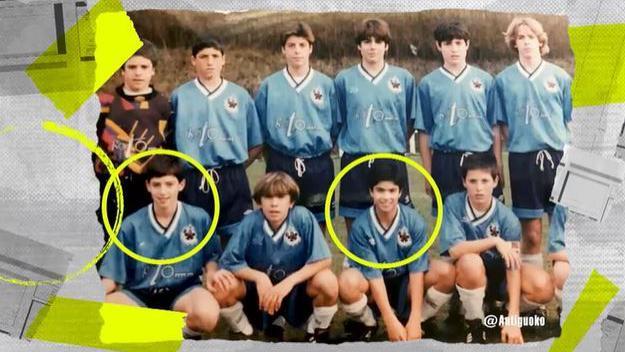 Antiguoko
AntiguokoKelly: What was it like growing up? Talk to me about your family.
Andoni: Since I was 10 or 11 years old, I always used to go to school on the train alone to San Sebastian. After school, I took a bus to training, and after I finished training my father came to take me. Both of my parents were working – they have been working always. I am used to moving myself since I was young, which has been good for my independence. When I moved, I was 16 and had to go to a new place. I was living alone which is not the easiest thing. But I think it has been good for me.
Kelly: Did you have any brothers or sisters?
Andoni: No.
Kelly: Who did you play football with growing up?
Andoni: In Spain, when you have a school, you have your morning, you have lunch then you have two hours free. Some people go home, and then they come for the afternoon and evening classes, so it was two halves of the day. In between I used to play football all the time. I couldn’t go back home so I stayed there playing football.
Kelly: If you hadn’t been a professional footballer or manager, what would you have done?
Andoni: I started two careers. I haven’t finished any! I started engineering – too ambitious because I was already playing football. I did more than half of the career but I didn’t finish it.
Kelly: How do you escape football?
Andoni: For me, it is quite easy. I have my wife and two kids and they are not much into football. Once I leave the work environment I go home and sometimes we don’t speak anything about football. It’s very good for me. When I have a day off my wife puts lots of plans in place!
Kelly: Your family have travelled around with you. Is it important to have them with you?
Andoni: My family is very important. They are sacrificing a lot. I am going from country to country to the best clubs I have the opportunity to go, and they have to come with me. I am very clear I couldn’t do this without them. If they tell me one day ‘I want to go back home’, I am leaving. We will go back home. I know there will be a moment in my career when I will have to not be the protagonist, when my kids are older and I won’t be the boss any more. I will be happy and we will go back home and I will be the supporting team behind. I know this moment will arrive.
Kelly: If your wife didn’t plan anything for your day off, what would you do for yourself?
Andoni: I live in a place for nature and walks – Bournemouth is one of the best places in the country.
Kelly: I read you are big into reading. Is that a way you escape?
Andoni: Yes. For me, reading is a big help. You forget a little bit about everything else happening around you. It’s something that has helped me from the mental side. I use reading and I use the bike. They are the two ways I forget about the problems you always have when you are a manager.
Kelly: What are you most proud of?
Andoni: Probably about the good relationship I have right now with all the clubs I have been at. As a player, as a manager, if I go back to every club it would be a lovely moment to see good people. I have been lucky. The most important thing when I come to a new club is this. When I leave, I hope everyone has good things to say about me. When I come back 10 years later, I still have relationships with people inside the clubs. This has happened in all the clubs I have been and I hope it continues.
Kelly: You want to be known as a good manager, but a good person first?
Andoni: Yes, you are not going to be successful every time. Even in places that it’s not going to work, I hope I leave with good relationships.
Kelly: Tell me one thing about yourself that will surprise me.
Andoni: This is the most difficult one. I do quite normal things. People get surprised with how I go on holiday, for example. Every time I go on holiday, we rent a car, we go in the city – sometimes we don’t know which hotel we will be staying in. We go day to day, with my wife and the kids. I enjoy visiting countries like this, not with a fixed plan, a little more open.
Kelly: So you like living a normal life?
Andoni: Very, very normal.
Kelly: If you could only achieve one more thing in your career, what would it be?
Andoni: Football-wise?
Kelly: Whatever… go where you want with it.
Andoni: I wouldn’t go football, I would go to my personal life. Especially when you are a father, your focus is more on your kids. I would love that my kids have a good life. They have been following me for some years and I hope I can give them a good life, or at least protect them for life as good as I can. That would be my biggest desire.
European Parliament snubs Orbán with vote to shield Italian MEP from Hungarian arrest


Life, loss, fame & family – the IFI Documentary Festival in focus


Fatal, flashy and indecent – the movies of Adrian Lyne revisited


Key oceans treaty crosses threshold to come into force
EU renews support for WHO’s Universal Health Coverage Partnership


Twilight at 20: the many afterlives of Stephenie Meyer’s vampires


Farewell, Sundance – how Robert Redford changed cinema forever


What is KPop Demon Hunters, and why is everyone talking about it?